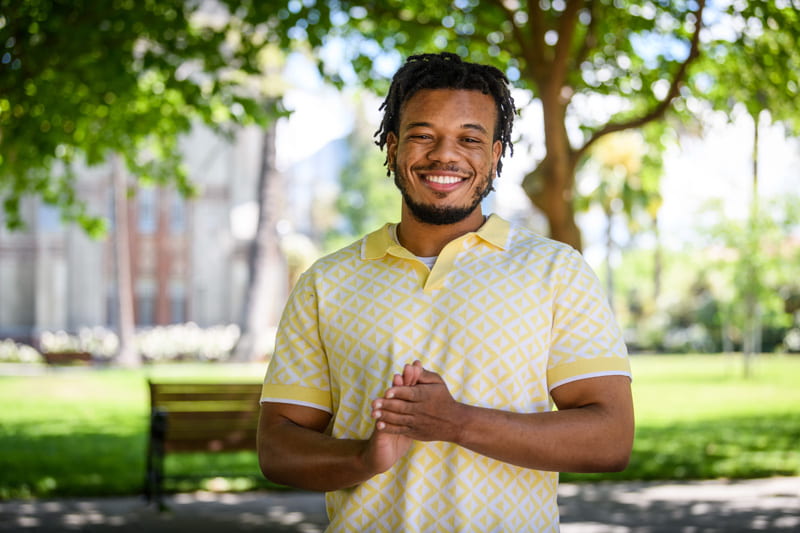Victory for Health Activism; SJSU Student Wins at CSU-Wide Research Competition

Justise Wattree, ’23 Humanities, researched the actions of Black health activists during past pandemics for his winning project, which he hopes will help reimagine future conversations to address health disparities. Photo: Robert Bain.
Justise Wattree, ’23 Humanities, has always wanted to be a researcher, and his recent first-place finish at the 2022 California State University (CSU) Research Competition solidified that on April 29–30. The competition showed him that he has not only the skills to successfully pursue research as a career but also that his research has an impact — “which is what matters to me the most,” he said.
Wattree’s winning project “The Two-Front War: Self-Help and Black Health Activism During the Spanish Flu, HIV/AIDS, and COVID-19,” explored how the Black community worked to fight health disparities during the COVID-19 pandemic, compared to previous pandemics in the last century.
Out of 182 submissions from 221 student participants at the CSU competition, there were 44 total award winners from 19 different CSUs. Wattree took first in the Undergraduate #1, Humanities, Arts and Letters session, winning $500. He was one of eight students from San José State University who advanced to the competition from SJSU’s Research Scholarship, and Creative Activity (RSCA) Competition earlier this year.
“The research is personal because I am Black,” he shared. “And I have seen how this pandemic has affected my family and community.”
“I think COVID-19 exposed how severe health inequities are within minority communities,” Wattree continued. “This project is based on my curiosity about exactly how Black health activism has been and is being used to address systematic racism and pandemics. So, I hope this project can be used to give a historical framework to conversations dedicated to finding ways to fight health disparities.”
“We know that student RSCA has profound impacts on participants, setting them up for great success in the future,” said Richard Mocarski, associate vice president for San José State’s office of research.
“The strength of SJSU’s RSCA was evident in this year’s competition, as all the projects and students displayed sophistication in their projects. Justise’s project was really exemplary and is ready to be disseminated through other means such as journal publication.”
Erik Johnson, lecturer in the Departments of Humanities and English and Comparative Literature, was Wattree’s RSCA guide and mentor for the project. The two had already developed a productive working relationship in SJSU’s Humanities Honors program, which is a tight-knit, team-taught four-semester program.
In the program, students and instructors have “multiple opportunities for genuine intellectual conversation among the students themselves, and between the students and their instructors, which really helps to set up outcomes like this one,” said Johnson.
He describes Wattree’s work in the honors program as “intellectually fearless,” as he readily connects his research interests with his personal knowledge in creative ways. “Justise would write the risky experimental paper that he would learn something interesting from writing, rather than the paper with the neat thesis written to get a good grade,” Johnson recalled.
When it came to this particular project, which is also Wattree’s capstone for the program, Johnson said the comparative approach showcased Wattree’s strengths, as it let him combine on-the-ground community-based research with library-based archival research.
What was most surprising for Wattree? “How much the Black church is involved with health activism,” he said. “The community really looks to the church to understand pandemics and how to respond, thus making religion, I would argue, an essential component of Black health activism.”
Over the summer, Wattree will intern in Washington D.C with the nonprofit Us Helping Us, People Into Living Inc. and continue researching racial health disparities in treatment among those diagnosed with HIV and hepatitis C.
“I’m also a part of the McNairs Scholars Program,” shared Wattree. “For that, I am conducting
research investigating if involvement in local activism affects the way Black churches respond to pandemics.”
In order to participate in SJSU’s RSCA competition, students must be current undergraduate or graduate students, or alumni who received their degrees in spring, summer or fall 2021. The process included a detailed application and an eight-minute presentation each student selected gave to a panel of faculty judges.
Participants must also be working on their original RSCA with a faculty advisor. At SJSU, faculty of all appointments, from lecturers to tenured professors, are involved in research across all disciplines. The university recognizes faculty and student research at its annual Celebration of Research event each April, at which the finalists of the student RSCA competition were named.
Related Stories

More than 4,000 Spartans Graduate This Fall

Lucas College and Graduate School of Business Ranked Among Top Online MBA Programs for Second Consecutive Year

Madison Wilber, Coming to You Live From SJSU

